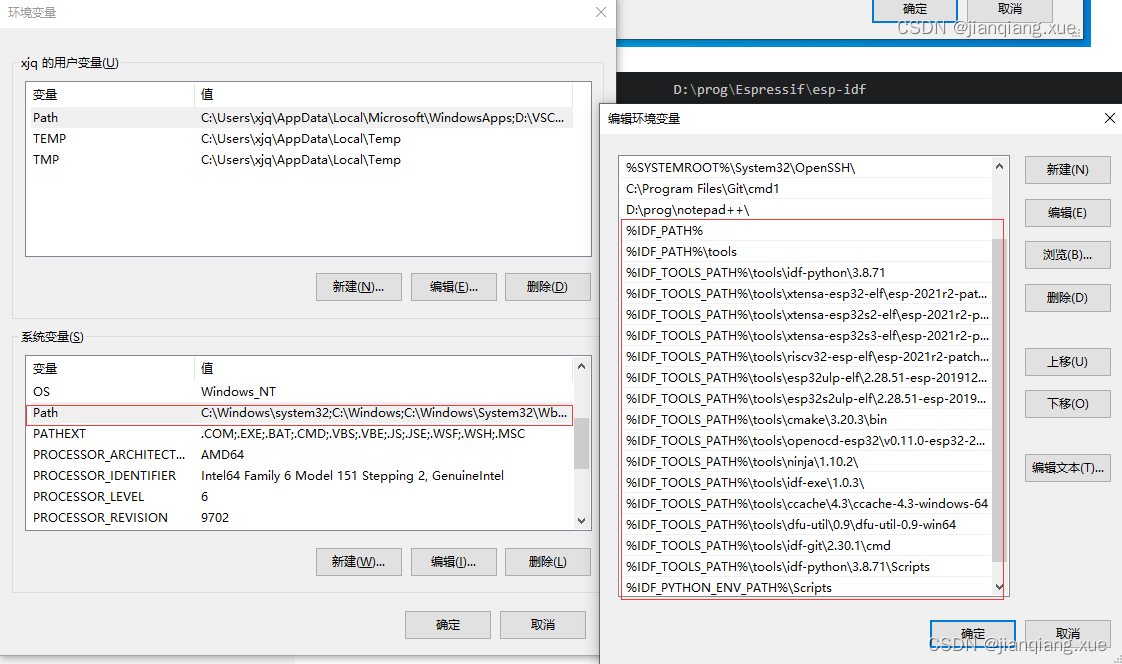Download address: https://pan.baidu.com/s/1-oGcJ0p-iV4WZ9d6lL0KaA
Extraction code: 7v35
Espressif4_4_1 streamlined portable: https://download.csdn.net/download/qq_29246181/86399639
VSCode1.61_Embedded Convenient_Including essential plug-ins: https://download.csdn.net/download/qq_29246181/86244991
1. Unzip the compressed file to the root directory of drive C
C:prog

Copy [settings.json] to "C:UsersUsernameAppDataRoamingCodeUser"

2. Install the VScode plugin Espressif IDF


3. Compile the routine and debug
Use VScode to open C:progEspressifesp-idfexamplesperipheralsgpiogeneric_gpio
Select the corresponding chip model and then execute the compilation

After compiling, execute burning

Open the observation window and view the serial port log

The second method: Change any drive letter
Portable vscode v1.69.1, integrated embedded common plug-ins (unzip and use) Download:
Portable Espressif v4.4.1, after decompression, write the environment variables. Download:
The environment variables that need to be added are as follows:



IDF_PATH D:progEspressif
IDF_PYTHON_ENV_PATH %IDF_PATH%toolspython_envidf4.4_py3.8_env
IDF_TOOLS_PATH %IDF_PATH%tools
Add the following to PATH:
Manually add once
%IDF_PATH%;
%IDF_TOOLS_PATH%toolsidf-python3.8.7;
%IDF_TOOLS_PATH%toolsxtensa-esp32-elfesp-2021r2-patch3-8.4.0xtensa-esp32-elfbin;
%IDF_TOOLS_PATH%toolsxtensa-esp32s2-elfesp-2021r2-patch3-8.4.0xtensa-esp32s2-elfbin;
%IDF_TOOLS_PATH%toolsxtensa-esp32s3-elfesp-2021r2-patch3-8.4.0xtensa-esp32s3-elfbin;
%IDF_TOOLS_PATH%toolsriscv32-esp-elfesp-2021r2-patch3-8.4.0riscv32-esp-elfbin;
%IDF_TOOLS_PATH%toolsesp32ulp-elf2.28.51-esp-20191205esp32ulp-elf-binutilsbin;
%IDF_TOOLS_PATH%toolsesp32s2ulp-elf2.28.51-esp-20191205esp32s2ulp-elf-binutilsbin;
%IDF_TOOLS_PATH%toolscmake3.20.3bin;
%IDF_TOOLS_PATH%toolsopenocd-esp32v0.11.0-esp32-20211220openocd-esp32bin;
%IDF_TOOLS_PATH%toolsninja1.10.2;
%IDF_TOOLS_PATH%toolsidf-exe1.0.3;
%IDF_TOOLS_PATH%toolsccache4.3ccache-4.3-windows-64;
%IDF_TOOLS_PATH%toolsdfu-util.9dfu-util-0.9-win64;
%IDF_TOOLS_PATH%python_envidf4.4_py3.8_envScripts;
At the end; add
%IDF_PATH%;%IDF_PATH%tools;%IDF_TOOLS_PATH%toolsidf-python3.8.7;%IDF_TOOLS_PATH%toolsxtensa-esp32-elfesp-2021r2-patch3-8.4.0xtensa-esp32-elfbin;%IDF_TOOLS_PATH%toolsxtensa-esp32s2-elfesp-2021r2-patch3-8.4.0xtensa-esp32s2-elfbin;%IDF_TOOLS_PATH%toolsxtensa-esp32s3-elfesp-2021r2-patch3-8.4.0xtensa-esp32s3-elfbin;%IDF_TOOLS_PATH%toolsriscv32-esp-elfesp-2021r2-patch3-8.4.0riscv32-esp-elfbin;%IDF_TOOLS_PATH%toolsesp32ulp-elf2.28.51-esp-20191205esp32ulp-elf-binutilsbin;%IDF_TOOLS_PATH%toolsesp32s2ulp-elf2.28.51-esp-20191205esp32s2ulp-elf-binutilsbin;%IDF_TOOLS_PATH%toolscmake3.20.3bin;%IDF_TOOLS_PATH%toolsopenocd-esp32v0.11.0-esp32-20211220openocd-esp32bin;%IDF_TOOLS_PATH%toolsninja1.10.2;%IDF_TOOLS_PATH%toolsidf-exe1.0.3;%IDF_TOOLS_PATH%toolsccache4.3ccache-4.3-windows-64;%IDF_TOOLS_PATH%toolsdfu-util.9dfu-util-0.9-win64;%IDF_TOOLS_PATH%python_envidf4.4_py3.8_envScripts;
3. Make IDF support C++17
xEspressiftoolscmakebuild.cmake
Four indefinite length receiving serial port data
Four indefinite length receiving serial port data
xEspressifcomponentsdriveruart.c
//read any size, only added two line to fucntion uart_read_bytes, marked with mk
int uart_read_frame(uart_port_t uart_num, uint8_t* buf, TickType_t ticks_to_wait) {
//mk: set to 1 so that it will pass the while
uint32_t length = 1;
uint8_t* data = NULL;
size_t size;
size_t copy_len = 0;
int len_tmp;
if(xSemaphoreTake(p_uart_obj[uart_num]->rx_mux,(portTickType)ticks_to_wait) != pdTRUE) {
return -1;
}
while(length) {
if(p_uart_obj[uart_num]->rx_cur_remain == 0) {
data = (uint8_t*) xRingbufferReceive(p_uart_obj[uart_num]->rx_ring_buf, &size, (portTickType) ticks_to_wait);
//mk: get actual length received
length = p_uart_obj[uart_num]->rx_buffered_len;
if(data) {
p_uart_obj[uart_num]->rx_head_ptr = data;
p_uart_obj[uart_num]->rx_ptr = data;
p_uart_obj[uart_num]->rx_cur_remain = size;
} else {
//When using dual cores, `rx_buffer_full_flg` may read and write on different cores at same time,
//which may lose synchronization. So we also need to call `uart_check_buf_full` once when ringbuffer is empty
//to solve the possible asynchronous issues.
if(uart_check_buf_full(uart_num)) {
//This condition will never be true if `uart_read_bytes`
//and `uart_rx_intr_handler_default` are scheduled on the same core.
continue;
} else {
xSemaphoreGive(p_uart_obj[uart_num]->rx_mux);
return copy_len;
}
}
}
if(p_uart_obj[uart_num]->rx_cur_remain > length) {
len_tmp = length;
} else {
len_tmp = p_uart_obj[uart_num]->rx_cur_remain;
}
memcpy((uint8_t *)buf + copy_len, p_uart_obj[uart_num]->rx_ptr, len_tmp);
UART_ENTER_CRITICAL(&(uart_context[uart_num].spinlock));
p_uart_obj[uart_num]->rx_buffered_len -= len_tmp;
uart_pattern_queue_update(uart_num, len_tmp);
p_uart_obj[uart_num]->rx_ptr += len_tmp;
UART_EXIT_CRITICAL(&(uart_context[uart_num].spinlock));
p_uart_obj[uart_num]->rx_cur_remain -= len_tmp;
copy_len += len_tmp;
length -= len_tmp;
if(p_uart_obj[uart_num]->rx_cur_remain == 0) {
vRingbufferReturnItem(p_uart_obj[uart_num]->rx_ring_buf, p_uart_obj[uart_num]->rx_head_ptr);
p_uart_obj[uart_num]->rx_head_ptr = NULL;
p_uart_obj[uart_num]->rx_ptr = NULL;
uart_check_buf_full(uart_num);
}
}
xSemaphoreGive(p_uart_obj[uart_num]->rx_mux);
return copy_len;
}
Previous article:[ESP32] Quickly build a vscode development environment (convenient)
Next article:[nrf51][nrf52] sd_power_gpregret_set special register
- Popular Resources
- Popular amplifiers
- Learn ARM development(16)
- Learn ARM development(17)
- Learn ARM development(18)
- Embedded system debugging simulation tool
- A small question that has been bothering me recently has finally been solved~~
- Learn ARM development (1)
- Learn ARM development (2)
- Learn ARM development (4)
- Learn ARM development (6)
 Professor at Beihang University, dedicated to promoting microcontrollers and embedded systems for over 20 years.
Professor at Beihang University, dedicated to promoting microcontrollers and embedded systems for over 20 years.
- LED chemical incompatibility test to see which chemicals LEDs can be used with
- Application of ARM9 hardware coprocessor on WinCE embedded motherboard
- What are the key points for selecting rotor flowmeter?
- LM317 high power charger circuit
- A brief analysis of Embest's application and development of embedded medical devices
- Single-phase RC protection circuit
- stm32 PVD programmable voltage monitor
- Introduction and measurement of edge trigger and level trigger of 51 single chip microcomputer
- Improved design of Linux system software shell protection technology
- What to do if the ABB robot protection device stops
- CGD and Qorvo to jointly revolutionize motor control solutions
- CGD and Qorvo to jointly revolutionize motor control solutions
- Keysight Technologies FieldFox handheld analyzer with VDI spread spectrum module to achieve millimeter wave analysis function
- Infineon's PASCO2V15 XENSIV PAS CO2 5V Sensor Now Available at Mouser for Accurate CO2 Level Measurement
- Advanced gameplay, Harting takes your PCB board connection to a new level!
- Advanced gameplay, Harting takes your PCB board connection to a new level!
- A new chapter in Great Wall Motors R&D: solid-state battery technology leads the future
- Naxin Micro provides full-scenario GaN driver IC solutions
- Interpreting Huawei’s new solid-state battery patent, will it challenge CATL in 2030?
- Are pure electric/plug-in hybrid vehicles going crazy? A Chinese company has launched the world's first -40℃ dischargeable hybrid battery that is not afraid of cold
- Come on Shenzhen
- Pingtouge RISC-V development board--STEP2--CDK environment construction learning, let the LED light start flashing
- Getting Started with MSP430F5529
- HPM6750 Evaluation of Pioneer Semiconductor Step 4 (FreeRTOS+TinyUSB+LVGL) Comprehensive Example
- Understanding the configuration of C2000 series CMD files
- MicroPython Hands-on (01)——After the Spring Festival, I bought a K210 chip AI development board
- FP8102 1A single-cell lithium-ion linear charging IC
- Design of Passive Acoustic Target Detection Platform Based on Single Chip Microcomputer and DSP
- 6. "Wanli" Raspberry Pi car - wiringPi learning (PWM and external interrupt simulation timer)
- Design of low power portable electrocardiograph based on MSP430


 TLE2061MUB
TLE2061MUB
















 京公网安备 11010802033920号
京公网安备 11010802033920号